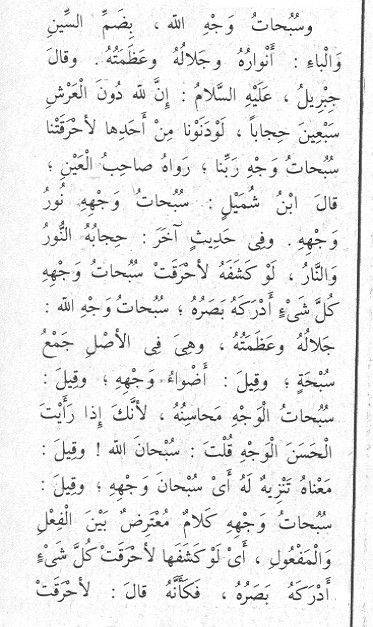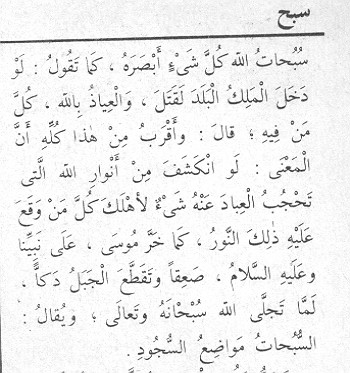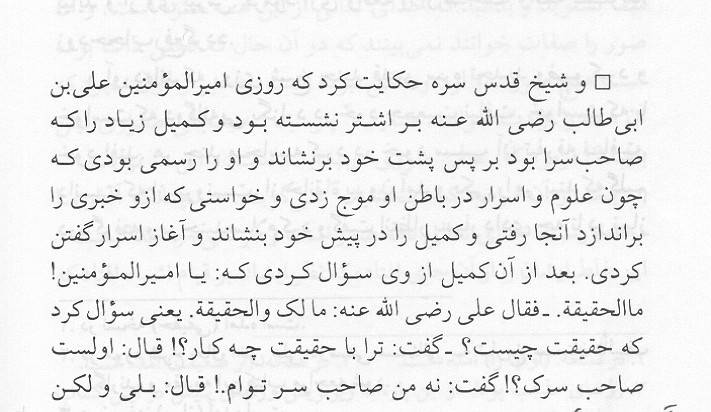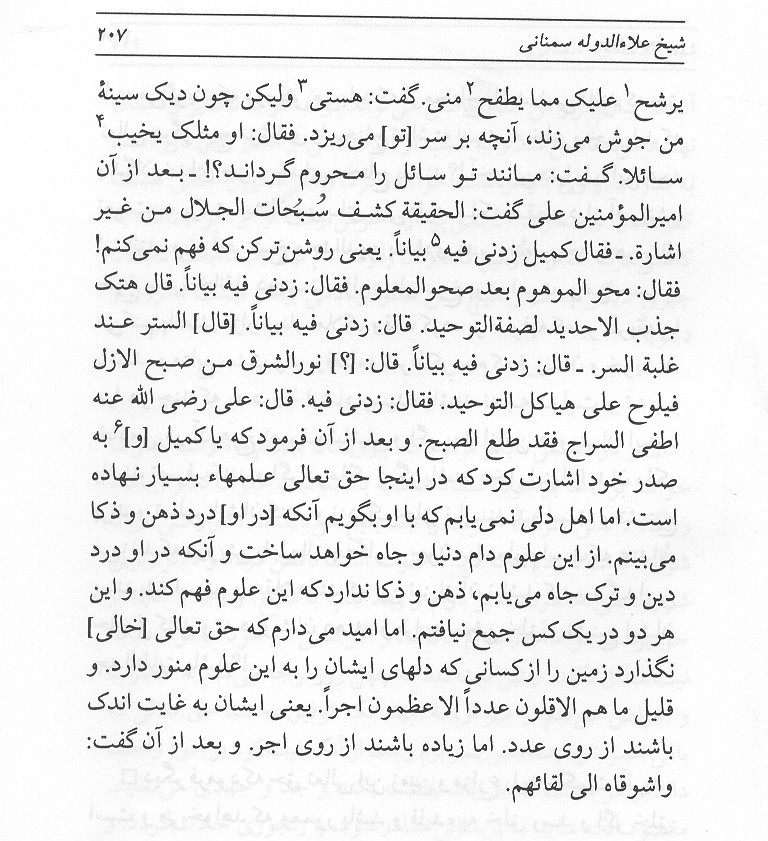
Forty
Sessions
The Fiery Dawn
Apercu
Discussion
Join
Sheikh Semnani narrates the
following story.
One day Imam Ali ‘Ibn Abi
Tālib was riding a camel and Kumail Ziad—Imam’s Sirr (Secrets’)
Confidant—was sitting behind him. This was Imam Ali’s usual behavior [1] when Sirr (the secrets) & knowledge would
tumult within him and in order to release some burden he would let
Kumail sit next to him whereat the Imam would commence divulging the
uncovered Sirrs (Secrets), as in one particular session:
Kumail: What is Haqiqa
(Absolute Truth)?
Imam Ali: What business you
have with Haqiqa? [2]
Kumail: Aren’t I the confidant
for your Sirr (Secret)?
Imam Ali: Yes, however (only)
what overflows within me spills over unto you!
Kumail: Are you the like of
someone that fails the questioner?
Imam Ali: Haqiqa (Absolute
Truth) is the Kashf (Uncovering) of the Sobohāt (Fiery
Manifest) of the Divine Jalāl (Momentous Glory) without any Ishārat
(Pointing,
Hinting At). [3]
Kumail: Tell me more about this
(I do not understand).
Imam Ali: Fading off the
mental processes due to the awakening of the Divine Knowledge.
Kumail: Tell me more about this.
Imam Ali: Tearing apart the
barriers (boundaries) for the Sifat (Attribute) of Tawhid (Divine Oneness).
(Translation?)
Kumail: Tell me more about
this. [4]
Imam Ali: The curtain veiling
the triumphant Sirr (Secret) (or the curtain veiling the chatter of the
secrets). [5]
Kumail: Tell me more about this.
Imam Ali: The dawn’s light
from the morning of the Azal (Sempiternity) gleaming upon the altar(s)
of Tawhid (Divine
Oneness). [6]
Kumail: Tell me more about this.
Imam Ali: The lamp dies down
when the morning dawns (or the lamp’s light drowns in the morning’s
dawn). [7]
Pointing to his chest Imam Ali
continued, “Plethora of knowledge being placed/hidden here by Allah
Almighty but I do not see any Dard (Seeker’s Pain) [8]
within people’s hearts for intelligence & intellect. They would
craft a trap from this knowledge within my chest to entrap fame &
worldly gain and on the other hand the ones with the Dard (Seeker’s
Pain) for the Din (Divine Way, Religion) who have forsaken fame have no
intelligence & intellect to understand this knowledge. However I
much hope that Allah Almighty leave not this earth empty of people
whose hearts illuminated with such knowledge: They are indeed few in
numbers but large in their rewards.” And afterwards Imam Ali concluded,
“I yearn to meet them in person…”.
End.
Apercu
This is the description of a
person at the very end of the Divine Path where his heart & soul
are not enough to contain the knowledge and affection that is pouring
in, so he seeks another ‘container’ or ‘goblet’ to spill over into. As
we see in the behavior of the Imam Ali, the human touch was very
important i.e. another human being became the extension of Imam Ali to
express & contain the uncovering of the secrets. This goes in the
reverse of our modern misanthropic view of the spirituality where the
seeker of the secrets of the Divine is a lonely person avoiding all
human contacts to be pure to uncover secrets—a hermit in a cave.
Also note the concept of
“spill over”: What was uncovered within Imam Ali was beyond the
verbiage of the words, little that had spilled over was indeed within
the scope of human language to transmit from one person to another.
[2] We
observe a subtle point: Sirr (Secret) is not just given to someone
because they asked for it, there has to be a justification or need.
Though this justification could be symbolic, the receiver must be given
permission to view the spilled over secrets not just ask or probe. In
other words these uncovered Sirr (Secret) were exclusive to the person
of Imam Ali for that moment in space and time, they were not meant for
someone else unless there was a reason.
[3]
Imagine a caveman brought to present time at Cape Canaveral
eye-witnessing the lift-off of the Space Shuttle in close proximity of
the launch pad. This is roughly the feel for the words of Imam Ali
describing the word Haqiqa: Something that is unveiled in front of you
in some fantastic visual form that you can see with certainty and
within you no doubts or even thoughts remains. Imam Ali’s use of the
word Ishārat (Pointing, Hinting At) indicates that even ‘hint’ not
present when Haqiqa is exposed within the human being.
Sobohāt:
(Source: Lisānol ‘Arab or The Language of The Arab)
Normally it is used in the
form, “Sobohāt of Allah’s Face (Countenance)” which means ITs
luminosity, glory & mightiness. Arch Angel Gabriel—peace be
upon—has said, “For Allah besides (before) the Throne there are seventy
veils, if we come close to any one of them Sobohāt of Allah’s Face
(Countenance) would burn us”. ‘Ibn Shomayl has said, “Sobohāt of ITs
Face (Countenance) means the light of ITs Face (Countenance)”. In
another Hadith (Prophetic Narration), “ITs veil is light and fire, if
you uncover it the Sobohāt of ITs Face (Countenance) shall burn
anything that sets eyes upon IT”. Sobohāt is the plural for Sobhah (In
many Sufi books it is written as Sabahāt which is incorrect). Some said
Sobohāt of ITs Face (Countenance) is ITs Beauty and if you saw the
beauty of ITs Face (Countenance) you would have said, “Sobhānallah!
(Praising Allah with amazement)”. If any of Allah’s lights are
uncovered—the ones that were veiling the slaves against IT—shall kill
anyone that meets this light, as (happened to) Prophet Moses who fell
down to the ground swooned and the mountain was shattered, once Allah
made Tajalli (Lucent Manifestation).


[4] The
Knowledge of Tawhid (Divine Oneness)
and what we rationalize about it is indeed a barrier that occludes our
vision of IT. Best I could translate what Imam Ali meant: Even tearing
apart that veil of Tawhid (Divine Oneness).
[5] I
am not sure what it means but I suspect the veil refers to previous
statement at [4] i.e. tearing apart the veil of Tawhid that veil behind
which the secrets chatter or that veil behind which secrets
triumphantly hide. Allah knows best.
[6]
Haykal was used in plural form of Hayākel that means altar or frame. I
believe the concept of the plural form is to show that Tawhid (Divine Oneness)
has many facets for human cognition.
[7] The
lamp—Allah knows best—means the human cognizance of Tawhid (Divine Oneness)
that is drowned in the light of the Azal (Sempiternity’s) dawn, perhaps
best being explained by Kashani's Lantern of Guidance:
“Tawhid (Oneness) due to
Propensity” is when Oneness becomes
a must for propensity/nature/inclination of the Mowah-hid (person in
the state
of Tawhid) and much of the darkness of customs/habits of his
existence—except a
little—succumbs to the terrific luminosity of Tawhid (Divine Oneness),
shattered and
dissolved. And the light of (human) knowledge of Oneness fades within
the light
of his propensity/nature like the light of stars vanishes within the
light of
the sun.
...
The origin of this Tawhid
(Oneness due to Propensity) is the
light of perception and origin of the “Oneness due to Knowledge” is the
light
of intimacy and closeness (to Beloved). By means of this Tawhid
(Oneness due to
Propensity) much of one’s humanity is pushed away like the sunlight
wipes out
most of the darkness upon the earth. But the light of the “Tawhid
(Oneness)
due
to Knowledge” is likened to the light of the moon illuminating the
earth where
some of the darkness is wiped off but mostly remains unlit. What
remains of the
Mowah-hid during the “Tawhid (Oneness)
due to Propensity” is the bare
necessities of actions and attributes required for his minimalist
physical
existence.
[8] Dard is
Farsi for pain. In Sufi terminology this is the pain caused within the
Morid (Seeker) who is excessively toiling to seek that Beloved. However
this part of the text is in Farsi and if the word is Dord (Sediment)
that is spelled the same way then the text reads similarly with the
connotation of things deep within their hearts like the bottomed
sediment: “Plethora of knowledge being placed/hidden here by Allah
Almighty but I do not see any Dord (Sediment) within their hearts for
intelligence & intellect. They would craft a trap from this
knowledge within my chest to entrap fame & worldly gain and on the
other hand the ones with the Dard (Sediment) for Din (Divine Way,
Religion)—within their heart—who have forsaken fame…” My vote is for
Dard (Sufi Pain).
©
2004-2002, Dara O. Shayda








